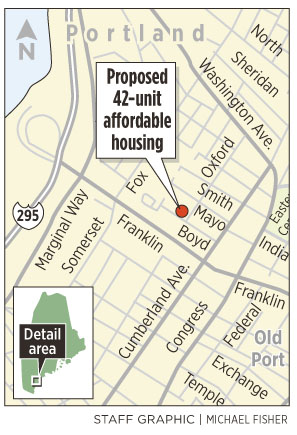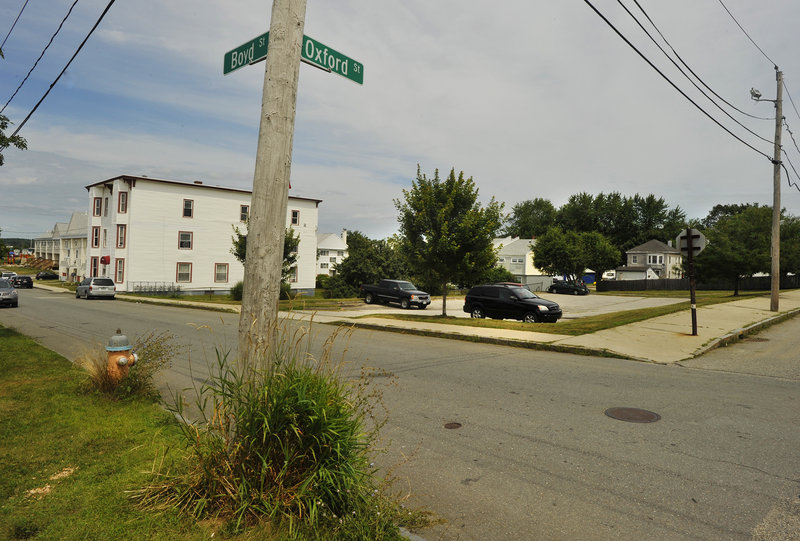PORTLAND – The Portland Housing Authority is leading an effort to develop affordable dwellings in an area of the city’s Bayside that was partially demolished as part of a “slum clearance” effort that took place during the 1960s.
Bayside Anchor would feature 42 units, the majority of which would offer rents ranging from $535 a month for an efficiency apartment to as much as $1,000 for a two-bedroom unit.
The apartments would provide housing to individuals and families who earn between $18,000 and $45,000 a year.
Bayside Anchor would be constructed in the city’s Kennedy Park neighborhood on a vacant Boyd Street parking lot near the intersection with Oxford Street.
The $7 million project would be financed with federal tax credits and federal funds administered by the Maine State Housing Authority and the city of Portland.
Greg Payne, a development officer with Avesta Housing, has been acting as the project’s development consultant.
Payne said Sunday night that Bayside Anchor learned recently that it also won a $250,000 low-interest loan after placing first in a national contest called Lowering the Cost of Housing Competition. The loan will be used to cover some of the project’s initial costs such as design and planning.
The competition was sponsored by Deutsche Bank and Enterprise Community Partners as a means of finding innovative projects aimed at building low-cost housing that is affordable to rent.
“At the heart of this project is a very important issue, creating affordable housing,” Payne said. “But the key is rather than building something on the cheap, building housing at a low cost while maintaining quality.”
News about the project surfaced last week when members of the Portland City Council’s Housing and Development Committee were scheduled to be briefed by the developers.
The meeting was canceled, but documents filed with the city outline the need for such a project.
The Portland Housing Development Corp. — the development branch of the Portland Housing Authority — said in its report to the council that during the 1960s, the city’s Slum Clearance and Redevelopment Administration demolished more than 200 structures in the Bayside neighborhood.
The historical street grid was destroyed and the two-lane Franklin Street was transformed into Franklin Arterial. East of Franklin Arterial, the demolished neighborhood was replaced with 200 units of low-density public housing.
“A generation later, the city has re-embraced the urbanism destroyed by slum clearance,” the report states.
Mark B. Adelson, president of the Portland Housing Authority, said his agency has teamed with Avesta, the Portland architectural firm Kaplan Thompson and the construction firm Wright Ryan to build Bayside Anchor.
Adelson said his group is also seeking $500,000 through the city’s HOME program — a federal block grant program through the Department of Housing and Urban Development.
“We’re excited about the project,” Adelson said. “It’s innovative and the housing is sorely needed.”
Adelson said if funding can be secured, the site plan will need to be approved by the Portland’s Planning Board, and the City Council will be asked to OK a zoning change that would relax density requirements.
The lot, which is surrounded by public housing, is 0.46 acres. The units will be modular and fabricated off site. Construction could begin in 2014.
Payne, Avesta’s development consultant, said the key to the project will be securing about $6.2 million in low-income housing tax credits from the Maine State Housing Authority.
Though the tax credits are federal, MSHA administers the credits and selects projects from around the state that compete for the funds.
Payne said he expects more than a dozen projects will compete for the credits, with only five being selected. The winners should be announced in November.
The credits are typically purchased by banks, which use them as a tax write-off.
If Bayside Anchor does not get the tax credits, the project will have to be abandoned.
“The project scored well (in the national competition), but we have no certainty that it will be funded. The tax credits are the linchpin of this project,” Payne said.
Dennis Hoey can be contacted at 791-6365 or at:
dhoey@pressherald.com
Send questions/comments to the editors.






Success. Please wait for the page to reload. If the page does not reload within 5 seconds, please refresh the page.
Enter your email and password to access comments.
Hi, to comment on stories you must . This profile is in addition to your subscription and website login.
Already have a commenting profile? .
Invalid username/password.
Please check your email to confirm and complete your registration.
Only subscribers are eligible to post comments. Please subscribe or login first for digital access. Here’s why.
Use the form below to reset your password. When you've submitted your account email, we will send an email with a reset code.